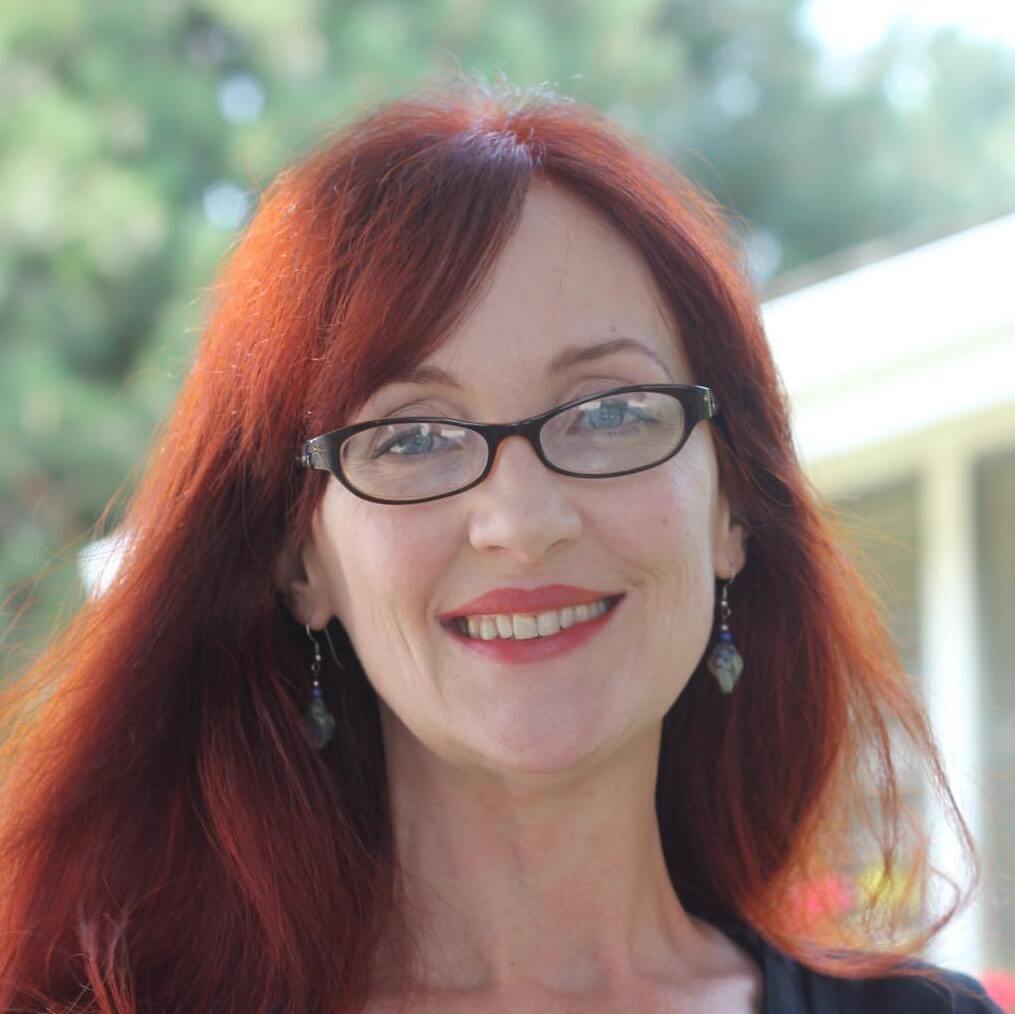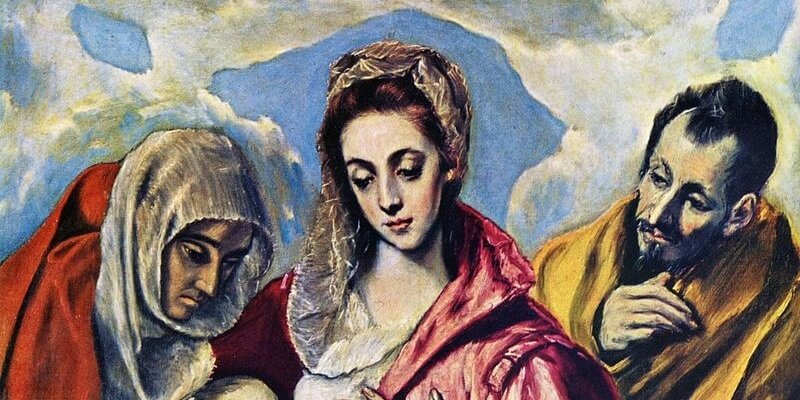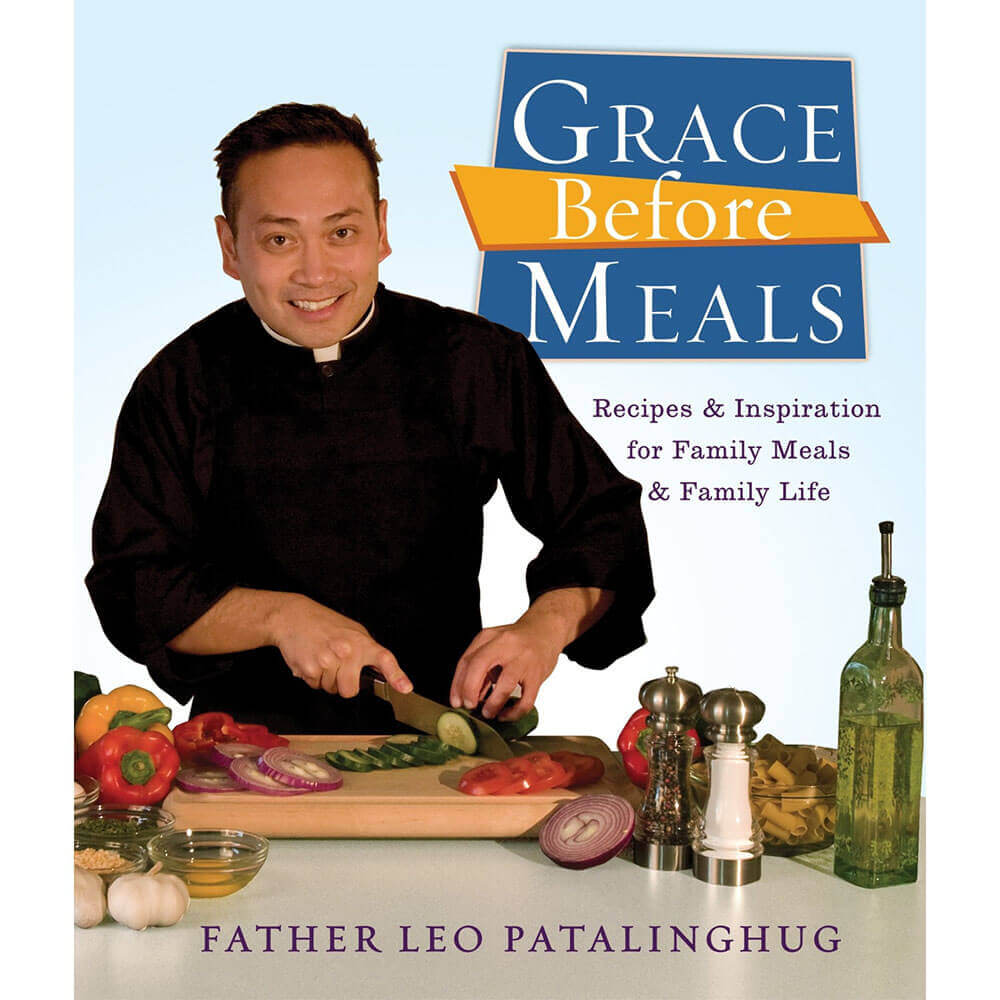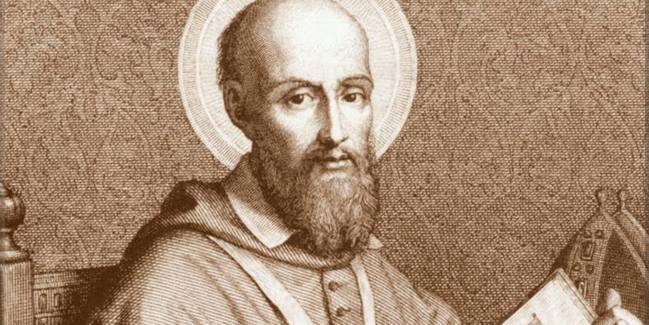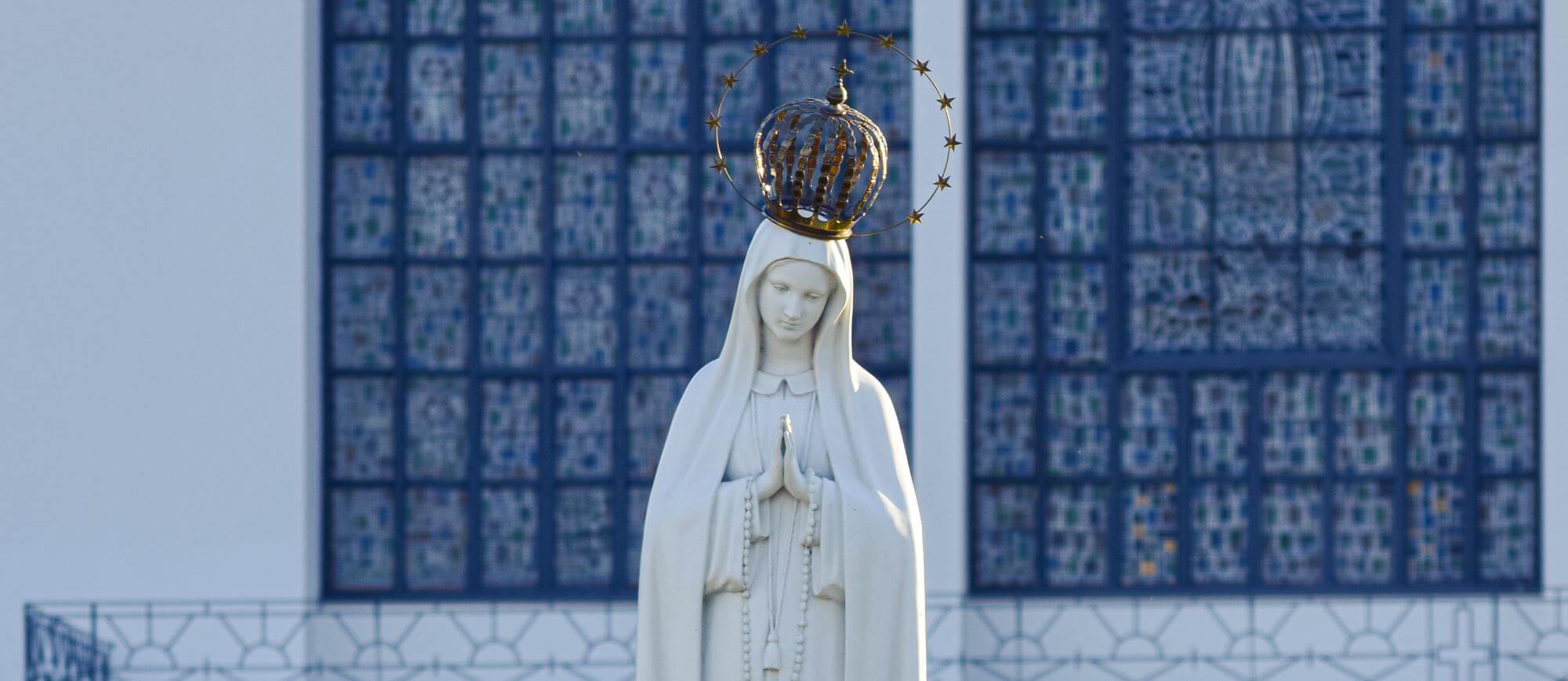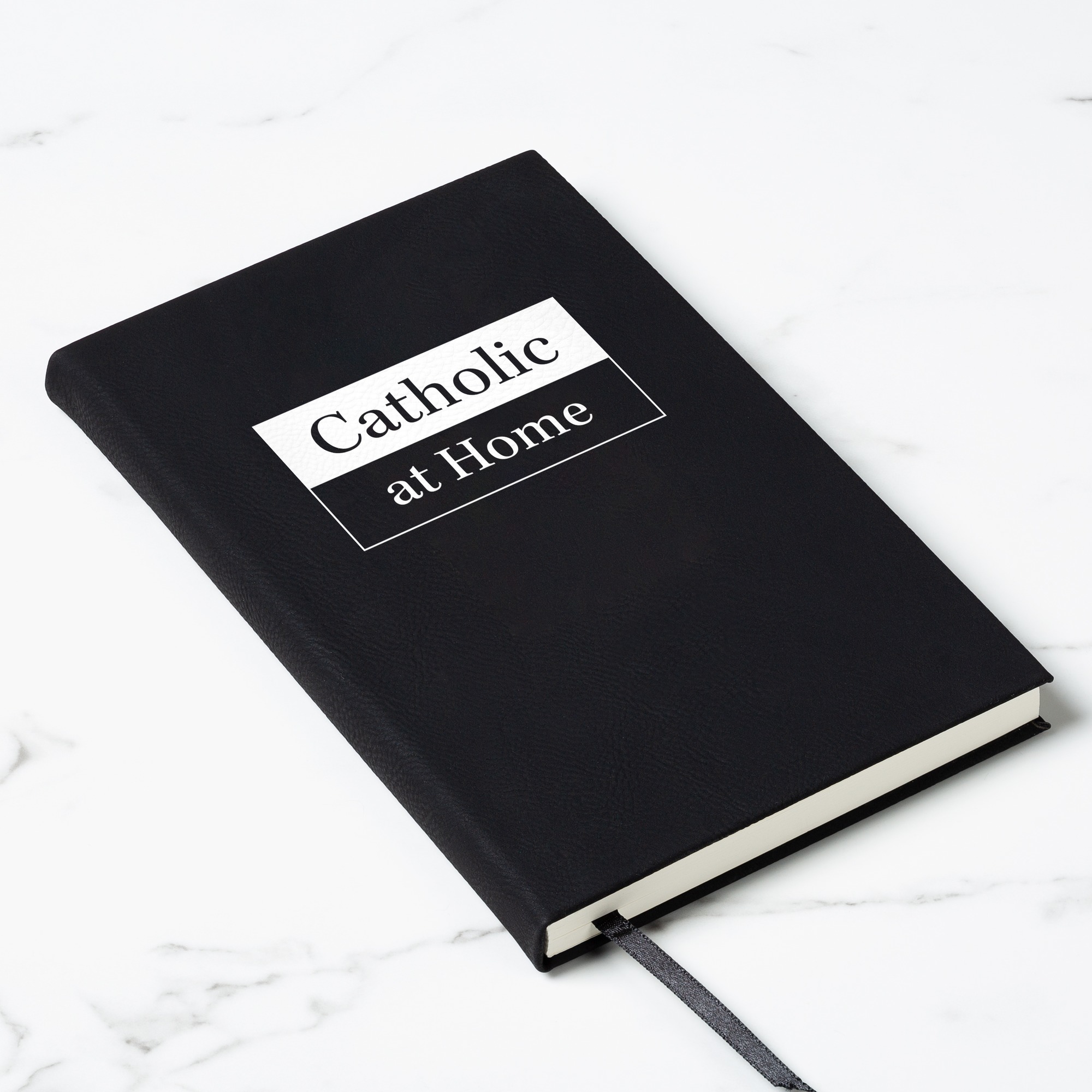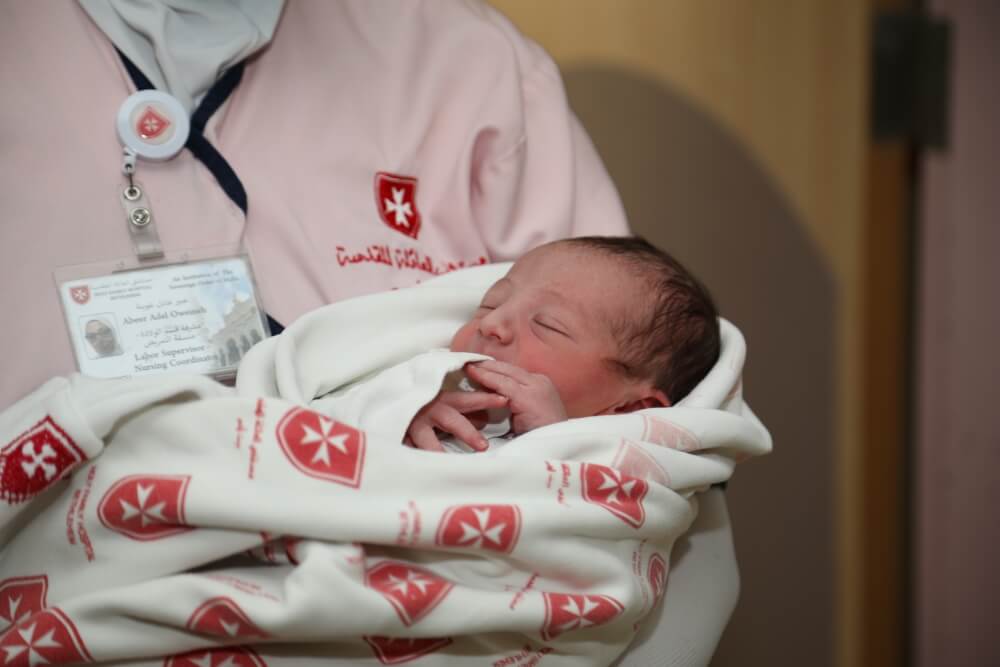
In Bethlehem, “It will be like the first Christmas. No parades, no fireworks, no lights, or Christmas trees. No gifts or celebrations. Just a babe born and placed in the manger in the deep, dark night under a star,” Michele Bowe, president of the Holy Family Hospital Foundation and the Order of Malta’s ambassador to Palestine, shared with Good Catholic.
Ambassador Bowe refers to the November 10th, 2023, statement from the Latin Patriarchs and Heads of the Churches in Jerusalem. In their Statement on the celebration of Advent and Christmas in the Midst of the War, they called for a solemn celebration of Christmas in Palestine, Jordan, and Cyprus. Instead of the usual large-scale display of resplendent decorations to celebrate the Nativity, the Patriarchs have asked their congregations to pray and sacrifice to end the war, which is causing great suffering:
“…[S]tand strong with those facing such afflictions by this year foregoing any unnecessarily festive activities,” they wrote.
In the letter, the Patriarchs decried the thousands of innocent civilians who have died, suffered severe injuries, lost their homes and loved ones, and/or lost their work.
“Yet despite our repeated calls for a humanitarian ceasefire and a de-escalation of violence, the war continues,” they lamented.
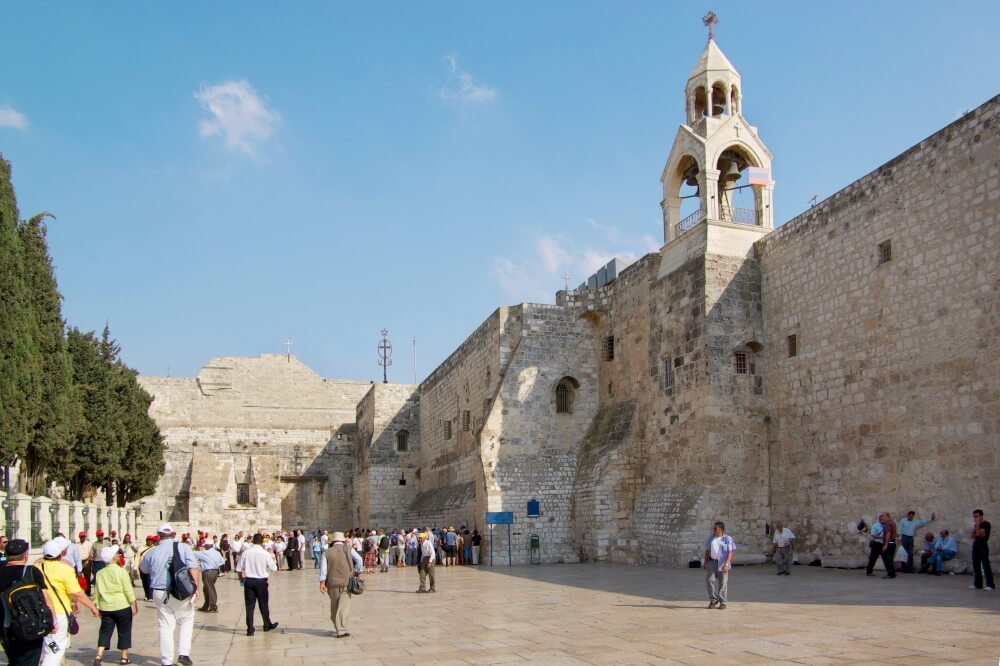
photo credit: Rundvald/CC BY-SA 4.0
The Patriarchs desire the faithful to focus more on the spiritual meaning of Christmas, and they invite those who can to contribute generously “for the relief of the victims of this war and for those in dire need, as well as to encourage others to join them in this mission of mercy.”
Even if the Patriarchs hadn’t called for a sacrificial Christmas, the people of Bethlehem are now too poor to buy gifts and even some food staples. The city was closed to pilgrims and tourists for Christmas 2020, 2021, and now 2023. Currently, most of the people of Bethlehem (population 28,591 as of 2017) have no work. According to Fr. Rami Askarieh, a Franciscan Brother and the parish priest of the Latin Church of St. Catherine in Bethlehem, more than 60% of the workforce depends on pilgrimages and tourism, while the remaining have permission to work in Israel [or are employed by Holy Family Hospital in Bethlehem]. However, since the war began on October 7th, 2023, Palestinians are not allowed to travel through Bethlehem’s one checkpoint into Israel, and there are no tours or pilgrimages in the Holy Land.
Ambassador Bowe adds, “And so probably 90% of the workforce is without salaries.”
Overflowing Churches
People are flocking to the churches to attend Mass and to pray. Ambassador Bowe says the “parishioners are seeking community and comfort and praying together is a welcome change to staying at home all day and listening to bad news.”
There are approximately 1,400 families who are members of St. Catherine’s parish. Fr. Askarieh shares that St. Catherine’s is “over full” with Palestinian Catholics and Orthodox Christians praying to end the cycle of violence. They’re calling on Christ, Prince of Peace, and for the intercession of Our Lady, Queen of Palestine, to bring peace to the Holy Land.
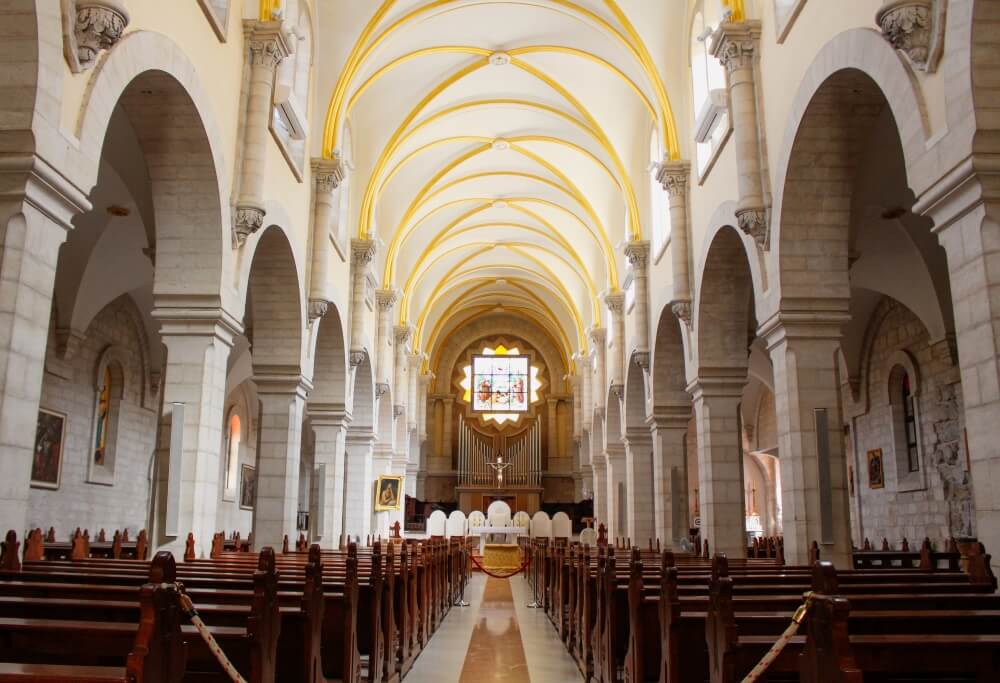
photo credit: Bashar Nayfeh/CC BY-SA 4.0
“We are also praying that God gives wisdom and illuminates the minds of responsible people, politicians, presidents, and militaries to choose to support humanity and not revenge,” he explains. “To use their capabilities to help everybody live with dignity and peace and happiness. This is what we pray for.”
Ambassador Bowe wonders how we devolved into thinking violence is the best way to solve our differences.
“It’s incumbent upon us to break the cycle of violence in our cities, in the United States, in our families, in the Holy Land everywhere. We owe it to our children. We owe it to this next generation. We owe it to that newborn baby who was just born five minutes ago, to be able to live a full life in peace.”
Holy Family Hospital
Bethlehem’s biggest employer is Holy Family Hospital, a Catholic teaching hospital managed by the Order of Malta, with 215 employees. It is a maternity hospital, specializing in labor/delivery and care for new mothers and babies, located 1,500 steps from the cave where Mary laid Baby Jesus in the manger. What makes this hospital especially noteworthy is not only its state-of-the-art facility, but also that it turns no mother away even if she cannot pay.
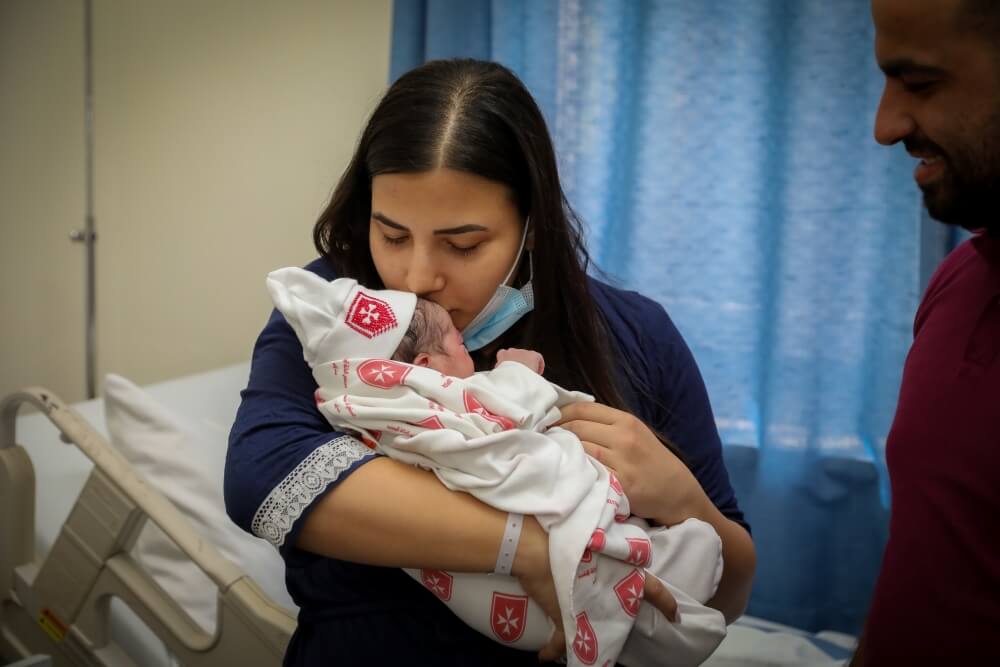
photo courtesy of Holy Family Hospital of Bethlehem Foundation
Ambassador Bowe shared that, since the war began, local donation streams have dried up, and the hospital may need more money to pay its employees. If that happens, the loss of income impacts the employees and their families and also the other people they help feed. Since COVID, every family has had to share their dinner table.
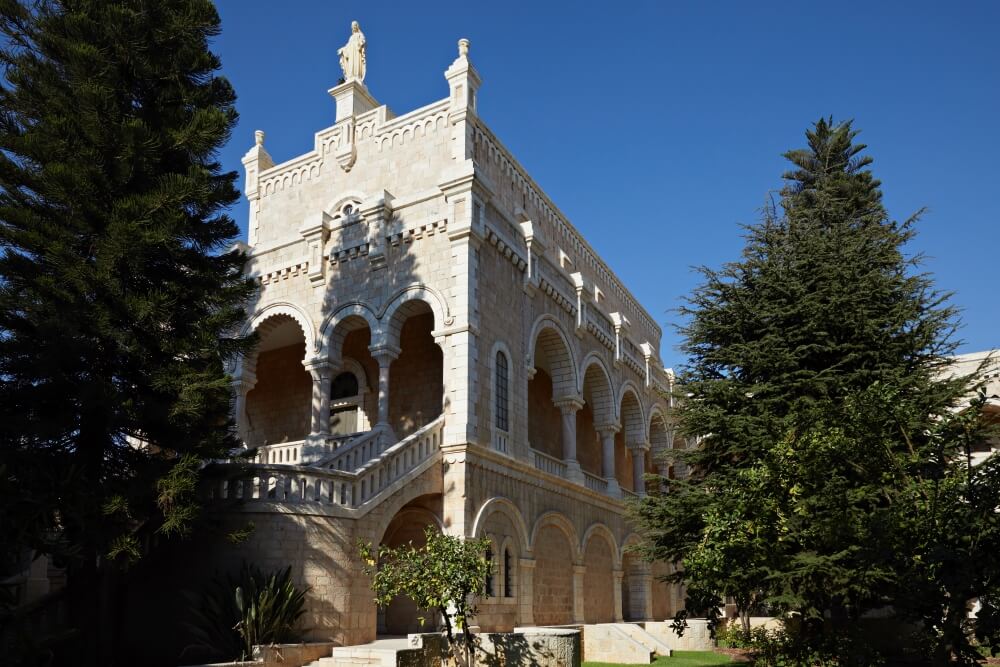
photo courtesy of Holy Family Hospital of Bethlehem Foundation
Bare Cupboards
Bethlehem is the most Christian area of Palestine and also the poorest, after Gaza. According to Bowe, the people are eating a restricted diet. The rising prices of meat and fresh fruit and vegetables make these items too expensive for them to afford. This is compounded by the aforementioned employment problems caused by the Israel-Hamas conflict.
Their government provides no social safety nets. People depend on the churches and those with jobs to help sustain them. It goes without saying that if the war goes long, the people will suffer severely.
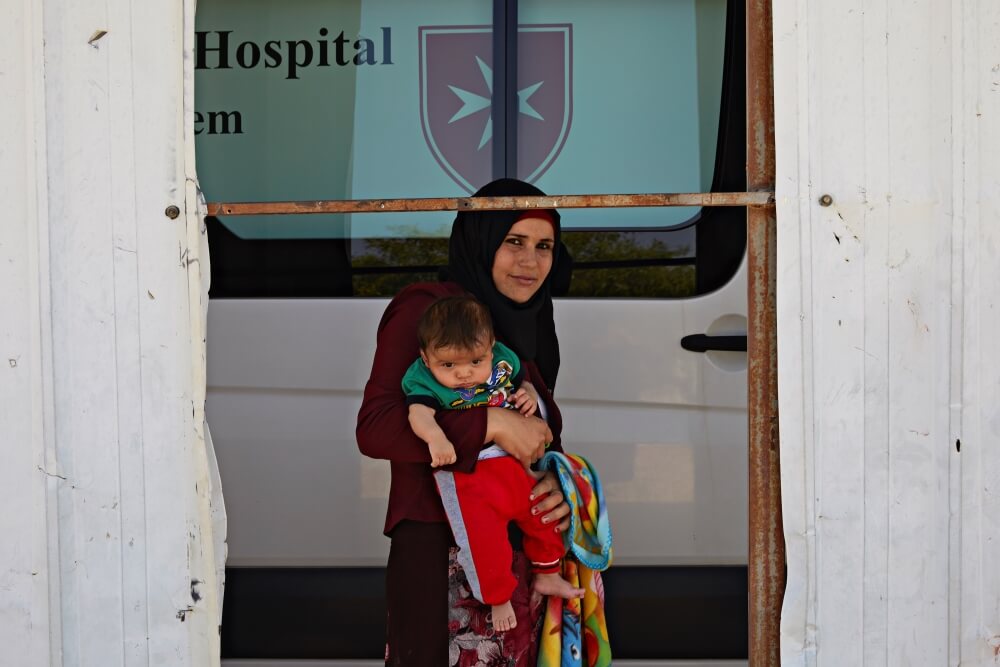
photo courtesy of Holy Family Hospital of Bethlehem Foundation
Even so, “Palestinians are resilient people,” shares Bowe.
“They’ve experienced a lot of hardship. They know how to stretch a pot of lentils and rice,” she says.
However, the babies will suffer the most because formula is in short supply. There’s also rationing of fuel supplies due to shortages. Sometimes, Holy Family Hospital’s vehicles cannot find enough gas, and the roads are no longer safe, leaving Bethlehem’s isolated villages and Bedouin communities without medical care. Approximately 45% of Holy Family’s patients are refugees.
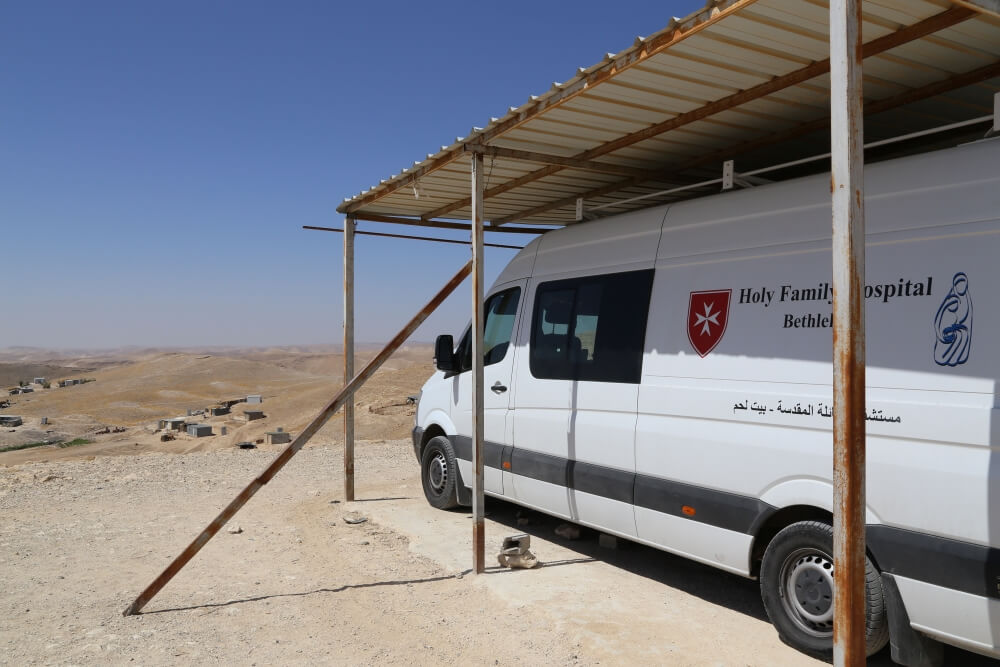
photo courtesy of Holy Family Hospital of Bethlehem Foundation
Fr. Askarieh directs the social services for St. Catherine’s in Bethlehem, so every day, he is confronted with the needs of the people, including groceries, rent, electricity, and medication. His social service work depends primarily on the Order of Malta’s generosity along with the Custody of the Holy Land (the Franciscans who care for the sacred sites in the Holy Land) and the Latin Patriarchate. They also rely on direct donations. He says he sees the needs of people growing. They are not yet starving like the people in Gaza, but it will get worse. He adds, “I think it will get much worse [for our people] not because of the war, but because of the consequences of the war.”
The People of Bethlehem “On Tenterhooks”
There’s also the stress of impending doom that looms over Bethlehem, which is located about 45 miles from Gaza. In Jesus’ birthplace, the streets are empty, the stores are shuttered, and many days schools are either closed or close early. Sounds of gunshots and warplanes interrupt the peacefulness of night. The people also feel unsettled by Israeli security forces’ presence in the refugee camps. Fear of war spilling over into Bethlehem has created an “atmosphere of fear.”
“Everybody’s on tenterhooks. The big question is whether the war will end with Gaza or whether it will spread,” Bowe shares. “We’re praying that it will end soon, so the rebuilding and reconciliation can begin. But it looks like it’s going to be a little more entrenched.”
Fr. Askarieh sees the fear in his parishioners’ eyes. He says they feel beaten down and that no one warrants to suffer one disaster after another. He says they are living in “a nightmare, a big prison.” He asks the world to care about the Holy Land.
“Everybody deserves dignity and freedom to live in peace. And in our land, it’s not happened for 70 years,” says Fr. Askarieh, who’s Jordanian.
Bedouins Suffering the Most
The Bedouin communities are the hardest hit. They live in isolated communities with a tiny electricity line that has stopped working.
“For a while, no one could go into the area to repair it. The community was also without safe drinking water because the UN wasn’t able to bring them water,” Ambassador Bowe says. “Their road was closed for security reasons.”
Because of the road closure, no one could leave the village except on foot or on a donkey. Bowe explains that Bedouin parents who had babies in Holy Family’s neonatal intensive care unit couldn’t visit their newborns.
“You can imagine that parents were just beside themselves to know that they were cut off from their babies,” she says. “As soon as the roads were cleared and they were able to travel, they got to the hospital as quickly as they could. They were crying and holding their babies. They wept tears of joy but also tears of sadness because they had to go home and the babies had to stay in the NICU. Parents would have to return to their villages not knowing if they could come back in a few days.”
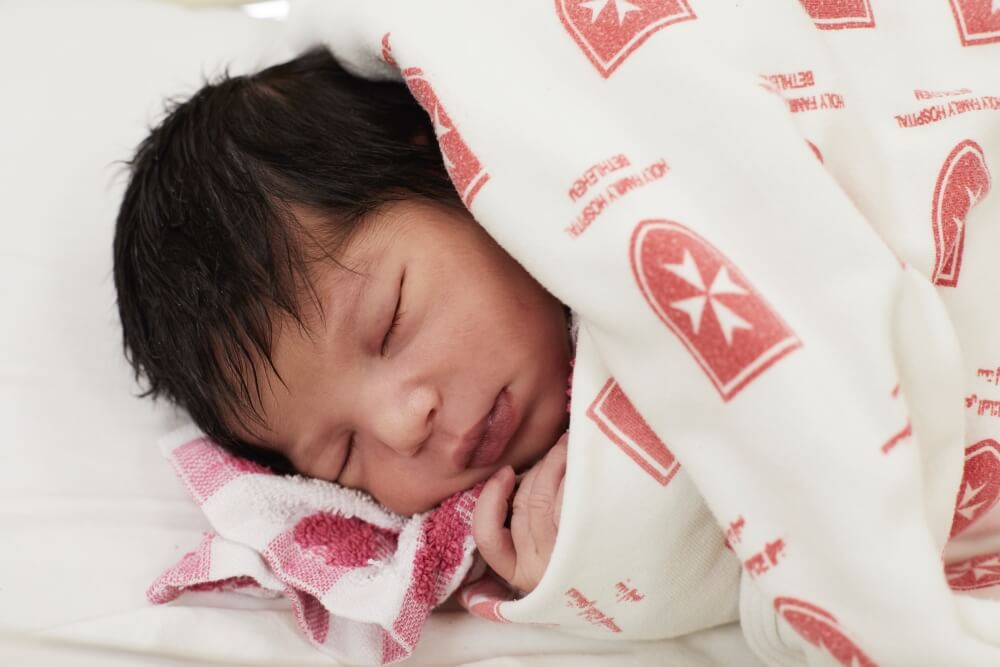
Travel is expensive and dangerous, and new checkpoints have been put up since the war in Gaza began. The checkpoints have turned a 40-minute drive to Bethlehem into a potential several-hour ordeal.
Bowe says that Holy Family’s NICU is quite full because women who are stressed are delivering early. The lack of water in some communities may also be contributing to premature deliveries. Their NICU offers level III critical care, with neonatologists regularly caring for infants born as early as 25 weeks.
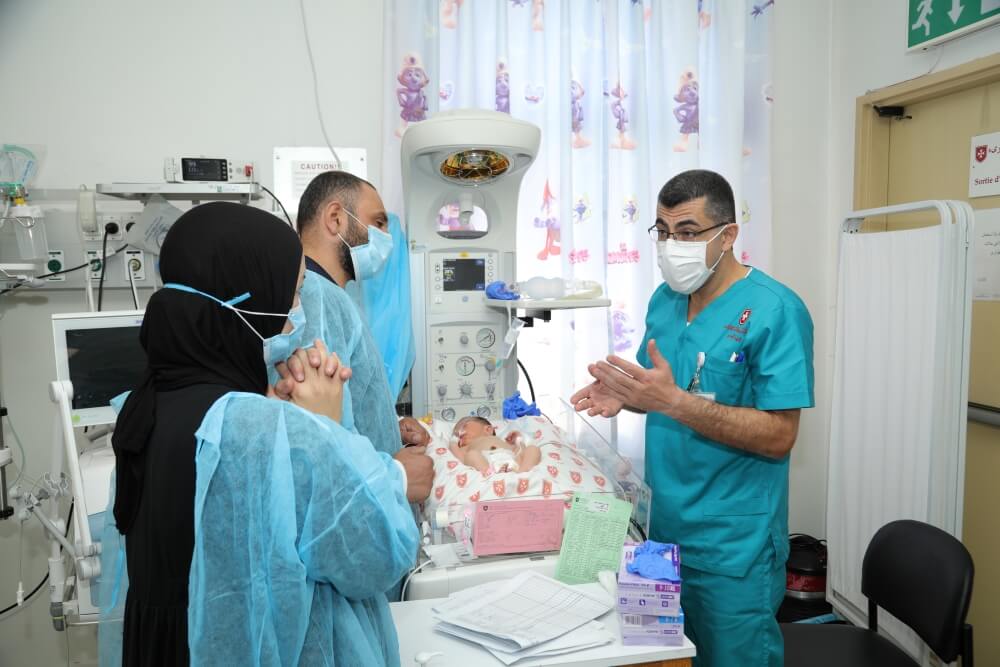
photo courtesy of Holy Family Hospital of Bethlehem Foundation
What We Can Do to Help
Prayer is the first thing we Catholics can do to end war. The biggest need for the people in Bethlehem is a sense of hope and security. Decades of violent history prove that our world leaders are not able to break the cycle of violence in the Holy Land. We need Our Lady to intercede. The Holy Family Hospital of Bethlehem invites Catholics to pray with them via a virtual Rosary for Peace every Thursday at 7:00 pm EST via Zoom.
Secondly, Holy Family Hospital needs donations to care for mothers and babies. Since 1990, they have delivered over 100,000 babies. They want to continue their mission.
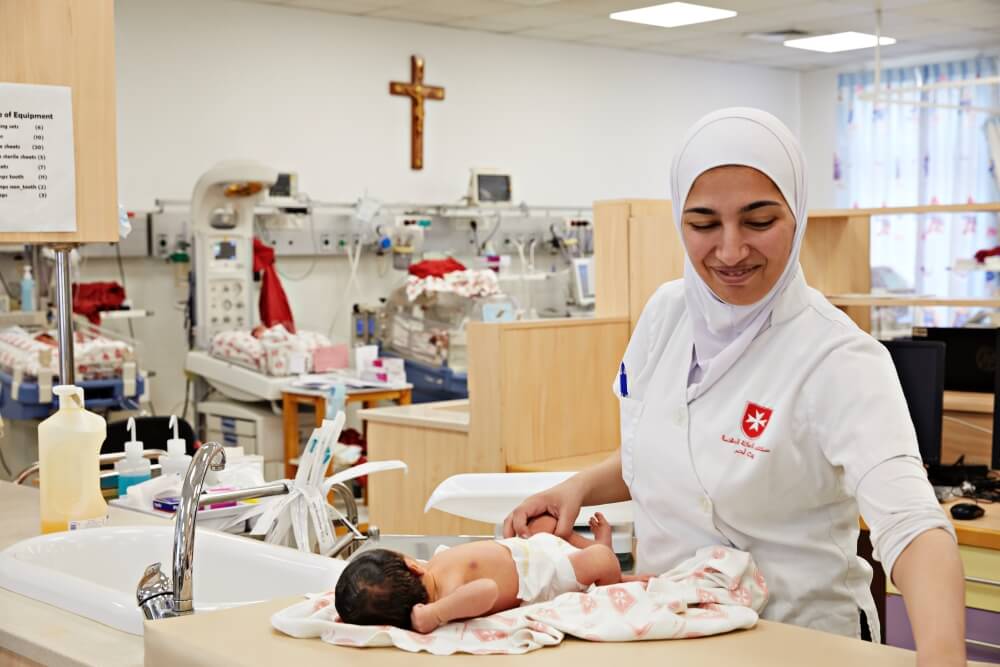
photo courtesy of Holy Family Hospital of Bethlehem Foundation
“We need to be able to keep our promise to Pope John Paul II,” Bowe says. “We promised him that we would run this hospital, and he named it as a Church priority for the millennium. We’re only in the first 23 years of that millennia.”
Bowe is redoubling her efforts to keep Holy Family Hospital afloat. She invites parishes and schools to participate through their Babies in Bethlehem Program; Angel Tree Tags to hang on Christmas trees; pulpit and bulletin announcements; and other materials. The Babies in Bethlehem Program offers an opportunity to reflect and prepare for Baby Jesus and reminds us of the universality of the Catholic Church.
Other ideas are a parish bake sale, a basketball shootout, or a baby shower where organizers could collect tax-deductible donations instead of baby gifts. Groups and individuals may also donate via card or check at Birthplaceofhope.org.
“We just need to be the bridge to get beyond this war to keep our doors open because we provide so much hope,” she says.
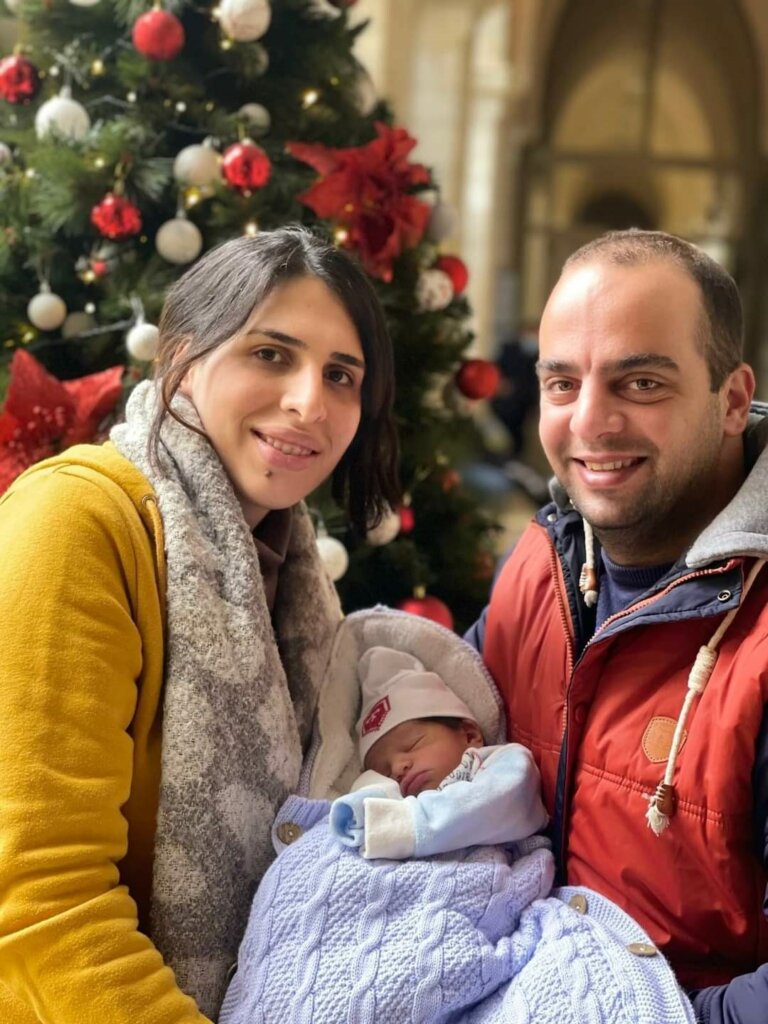
photo courtesy of Holy Family Hospital of Bethlehem Foundation
Bethlehem is a holy place where King David was born and crowned, where the Christ Child was born, where the Three Kings visited Him, and where the Holy Family lived. Ambassador Bowe calls Bethlehem the “birthplace of hope.”
“It’s the most beautiful work for us to keep Christianity in the Holy Land. Especially in Bethlehem, on the streets where the Holy Family walked,” she closes. “We owe it to that city to protect the old buildings, protect the people, and protect the peace of a city that has suffered so much.”
Featured image courtesy of Holy Family Hospital of Bethlehem Foundation.
